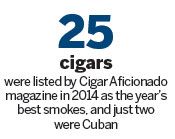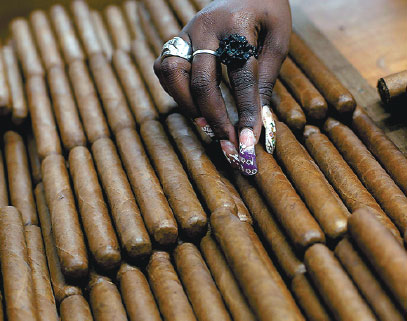Mystique of 'havanas' goes up in competitive smoke
For more than a century, Cuba was known to make the world's finest cigars - to the point where they simply became known as "havanas". But ever since Washington slapped a trade embargo on Cuba in 1961, those cigars have been a forbidden pleasure for US citizens.
Today, thanks to substantial foreign investment, improved business practices and the tobacco master blenders who left Cuba, many of the best cigars are not made in Cuba anymore.
Cigar Aficionado magazine publishes a list - seen as an industry standard - of the year's best smokes. Of the 25 cigars listed in 2014, just two were Cuban.
"US citizens have always had the allure of having a true Cuban cigar," said Bob Materazzi, owner of Shelly's Back Room, a dark but lively cigar tavern at the intersection of Washington's business, law firm and government districts.
"But there's been a whole generation of people who haven't had Cuban cigars, and they like the Dominicans" and others, Materazzi said.
Forbidden pleasure
Materazzi thinks it will take five years before Cuban cigars can hit the US market - and even then they will be at a disadvantage.
"They don't have quality control. They've overworked their crops," he said, ticking off the challenges Cuban manufacturers face. "A lot of their products are losing their character."
The situation is further complicated. By the fact that the United States does not recognize Cuban copyrights. Several companies now own foreign-branded copyrights of famed Cuban labels such as Montecristo and Cohiba.
"That's going to be a challenge for the cigar market, to say who owns the right to those names," said Justin Russell, a colleague of Materazzi.

What US smokers crave is the social camaraderie they find in the cigar world, regardless of brand, Russell said.
"I can order an $8 stick and still sit across from the guy who orders the $50 stick and I can light up with him and we talk about anything we want," he said.
Luxury smoke
Some patrons clearly enjoy luxury smokes - Shelly's sells a box of six Arturo Fuente Opus 22 limited edition cigars from the Dominican Republic for $325.
Even if Cuban cigars are ultimately introduced to the US market, smokers today are used to other tastes.
"For the last 50 years people have grown to know Nicaragua, Dominican and Honduran cigars," said Matt Krimm, co-owner of the Civil Cigar Lounge in Washington.
"Sure, people will come in and buy those Cuban products in part out of curiosity," Krimm said. "Whether it fits their taste profile or not is up for debate."
|
Cigars are shown at the H.Upmann cigar factory in Havana, during the annual Cigar Festival in 2013. Ramon Espinosa / Associated Press |
(China Daily 12/19/2014 page12)















